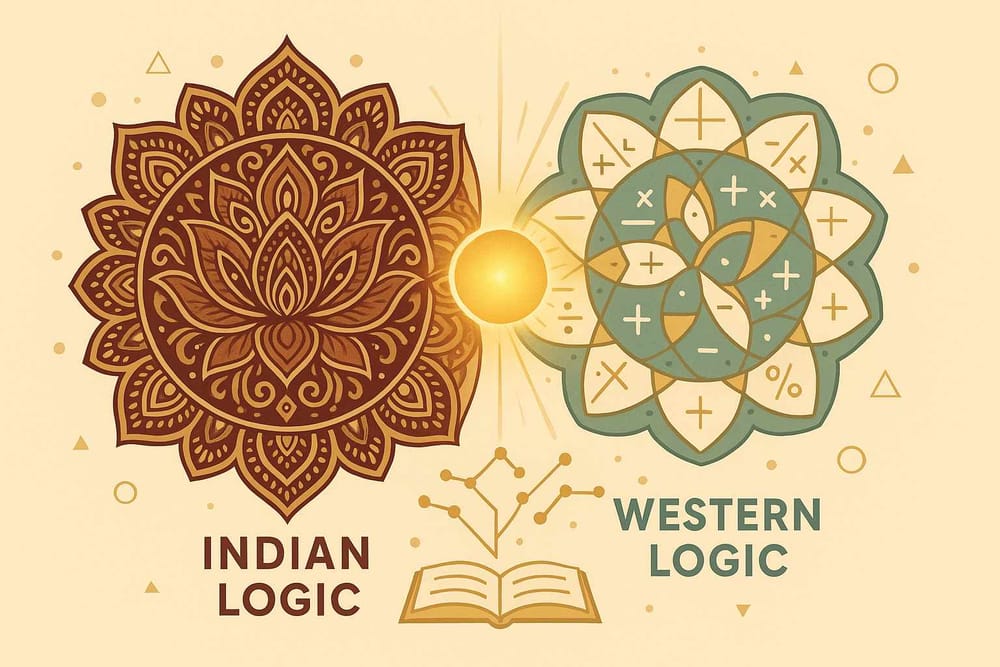
The Intersection of Cultures-Indian and Western Logic Systems: Analysis
Have you ever been in a friendly argument with family, where one person says, "It's simple, it's either this or that!" while another calmly explains, "Well, it depends... from my point of view, it's this, but from their side, it could be that"? This everyday scene over a cup of chai is a beautiful, living example of two profound ways of thinking that have shaped our world: the structured, direct approach often found in Western thought and the wonderfully layered, context-rich reasoning rooted in our own Indian heritage.
For centuries, humanity has tried to make sense of the world through logic. It’s the backbone of philosophy, science, and even how we navigate our daily lives. But here's the fascinating part – logic isn't a one-size-fits-all jacket. The way our ancestors in India approached truth is remarkably different from the path forged by the great thinkers of the West. Let’s take a walk down these two amazing paths and see what treasures they hold.
The Roots of Our Thinking: Where Did It All Begin?
To understand why we think the way we do, we need to travel back in time. The very origins of these logical systems tell us a lot about what each culture valued most.
- Indian Logic (Nyaya): A Quest for Ultimate Truth
Around 500 BCE, the great sage Akṣapāda Gautama gave us the Nyaya Sutras. For our thinkers, logic wasn't just a mental exercise; it was a spiritual tool. It was a path to understanding reality, freeing the soul, and achieving moksha. Our system, known as Nyaya, is built on pramanas—the valid means of knowing something. These include what we see with our own eyes (pratyakṣa), what we can infer (anumāna), what we can compare (upamāna), and the wisdom passed down through sacred texts (śabda). It was enriched over centuries by brilliant minds from Buddhist and Jain traditions, making it incredibly deep and nuanced. - Western Logic: Building a World of Order
In ancient Greece, philosophers like Aristotle were busy trying to bring order to the world of ideas. In his famous work, "Organon," Aristotle laid down the rules for syllogistic reasoning—a formal, step-by-step way to reach a conclusion. The Greek focus was on creating a system of universal truths that were either right or wrong, black or white. This deductive approach became the foundation for modern science, mathematics, and how the Western world builds arguments.
It's amazing how both cultures celebrated the art of debate. Our traditional shastrartha (scholarly debates on scriptures) had the same spirit of rigorous discussion as the dialectics practiced by Socrates and Plato in the streets of Athens. Both East and West knew that rubbing two brilliant minds together could create the spark of truth.
Two Paths to Truth: Key Differences That Shape Our Worldview
So, where do these two paths truly diverge? It’s in their very approach to life’s biggest questions. You might wonder how Indian logic views something as fundamental as a contradiction compared to Western logic. The difference is night and day.
In the West, a contradiction is usually a dead end—a sign that an argument is flawed. But in Indian thought, especially in philosophies like Jainism's anekantavada, a contradiction isn't a problem; it’s a doorway to a deeper, more complete reality. It teaches us that truth can have many facets. A thing can be true from one perspective and false from another, and both can exist together. Think of it like a diamond; every angle shows a different sparkle, but it’s all the same diamond.
This is why our Indian logic is often seen as more context-sensitive. It doesn't happen in a vacuum. It considers the situation, the culture, and the spiritual context. It allows for multiple truths to coexist, unlike the more generalized, one-size-fits-all approach of Western logic. This holistic nature is a reflection of the interconnectedness we see in the universe, a core concept in our spiritual traditions. You can explore more about how our scriptures connect science and spirituality in our blog, Beyond the Myths: Hindu Scriptures, Science, Spirituality, and Ancient Wisdom.
Finding a Beautiful Balance in Our Modern Lives
Now, the big question: can these two very different ways of thinking work together? Absolutely! In fact, they can complement each other beautifully and offer a more balanced way to live.
Imagine a modern Indian professional. At work, they might use the precision of Western logic to manage projects, meet deadlines, and analyze data. It’s clear, efficient, and gets the job done. But when they come home, they might use the wisdom of Indian logic to navigate complex family relationships, understand different points of view, and make decisions that honour emotion and connection, not just cold, hard facts.
By respecting the practicality of Western methods and embracing the deep wisdom of our own logic, we can create solutions that are both innovative and harmonious. This integration reminds us that true wisdom isn’t about choosing one path over the other. It’s about learning to walk on both, appreciating the unique strengths each brings to our journey.
This beautiful blend is a hallmark of our culture today. The vibrancy of our traditions isn't lost; it's just finding new ways to express itself in a globalized world. To understand more about this, check out our piece on the Vibrancy of Indian Cultures.
Studying the meeting point of Indian and Western logic helps us appreciate the amazing diversity of human thought. It sharpens our problem-solving skills by giving us more tools—the analytical precision of one and the contextual understanding of the other. It makes us better thinkers, and more compassionate human beings.
Your Path to Bhakti and Beyond
Here at Bhaktilipi, we believe in exploring these timeless traditions and stories in a way that resonates with our modern lives. We are your space to connect with the deep roots of Indian culture, whether it's through understanding complex philosophies or simple acts of devotion. We invite you to dive deeper with us.
Stay connected for more meaningful content that nourishes the mind and soul:
- Subscribe to our YouTube Channel
Join our community for inspiring videos, stories, and discussions that bring our heritage to life. You can find us here: Bhaktilipi on YouTube. - Follow us on Instagram and Facebook
Get your daily dose of bhakti, wisdom, and cultural insights by following our journey on social media. Join us on Instagram and Facebook.
Let’s grow together on this beautiful journey of bhakti and wisdom.
A passionate group of people dedicated to preserving India's knowledge of Dharma, Karma, and Bhakti for ourselves and the world 🙏.
